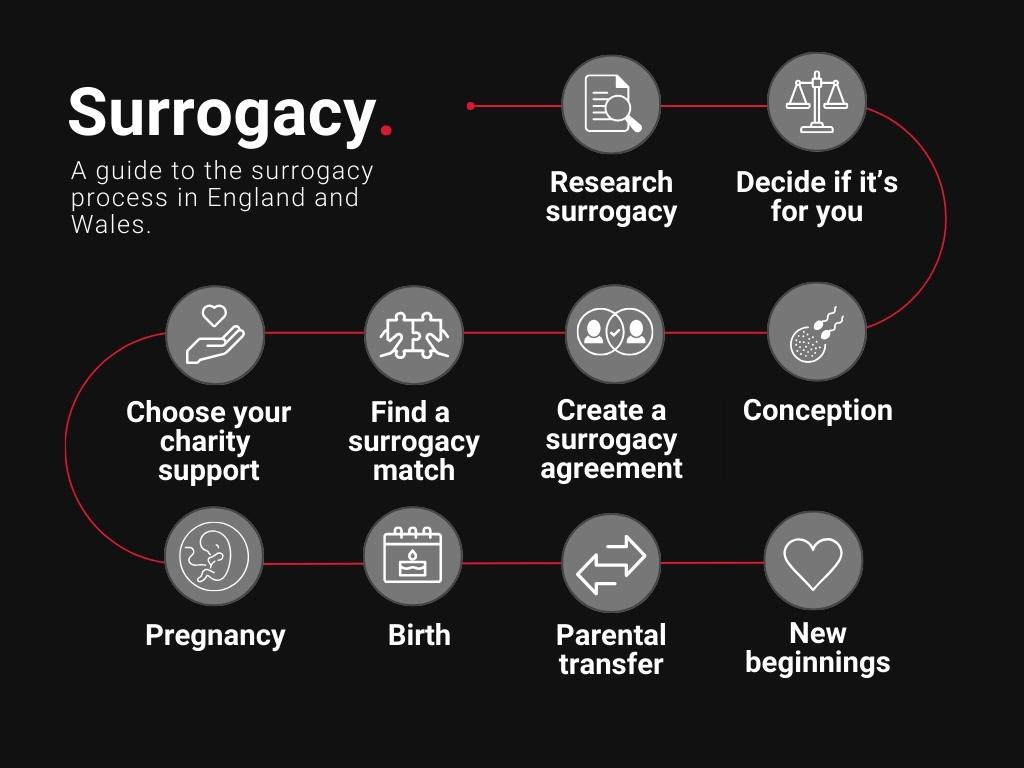Surrogacy can be a confusing and daunting subject, especially if you’re considering becoming a surrogate or are prospective parents thinking about surrogacy. There are many online resources that contain unclear or incorrect information and that can make the topic harder to understand.
Our goal in this article is to unpick some of the most common questions around surrogacy in England and Wales and provide an overview of what’s involved, to help you understand whether surrogacy is the right option for you.
The process and laws for international surrogacy can differ from that in England and Wales.
Ready to discuss surrogacy? If you’re looking for a solicitor to help guide you through the surrogacy process, just call us on 0203 007 5500, or submit a contact form.
What is surrogacy?
A surrogacy arrangement involves a person willing to carry out a pregnancy and birth on behalf of another person/couple (known as the intended parents).
Surrogacy must be a voluntary, non-paid arrangement. The surrogate can’t receive payment to be a surrogate but can receive compensation for any reasonable costs, such as health bills relating to the pregnancy or birth.
By law, when the baby is born, the birth mother (and their spouse or civil partner) is the legal parent. The intended parents will become the legal parents once they’ve applied for a Parental Order or adoption – more details on this to come!
Why do people choose surrogacy as their fertility option?
There are a few reasons why people choose surrogacy over other fertility options, such as IVF or adoption. Some of these reasons could include:
- People facing fertility issues.
- A single parent who wants to have children.
- Women who want to have a child using their egg but don’t want the inconvenience of a pregnancy, for example due to their career.
- Women who can use their egg to conceive but can’t carry a child due to other health reasons.
- People in a same-sex couple.
- Intended parents who want to avoid passing down a genetic defect or health condition.
- Single individuals who want a genetically related child but can’t carry the baby.
- If the birth mother can’t carry a pregnancy due to certain medications.
- Women who have frozen their eggs but can no longer carry a pregnancy e.g. if they’ve had a hysterectomy.
- People who have past traumas during pregnancy/labour but want to have more genetically related children.
Everyone’s surrogacy journey is unique to them and it’s important to be sensitive regardless of their reasoning.
Does surrogacy always require a fertility clinic?
England and Wales recognise two different types of surrogacy arrangement.
Host/Gestational surrogacy – When the surrogate’s egg isn’t used. For example, the intended parents use their egg or a donor’s egg. In these cases, a fertility clinic will need to assist.
Straight/Traditional surrogacy – When the surrogate uses their own egg, meaning that a fertility clinic isn’t necessarily involved.
The biggest considerations when thinking about using a fertility clinic are:
- Their requirements for people choosing surrogacy.
- The screening requirements that they have for donor sperm, if needed.
- The contracts they may use and how they could affect your rights (as both the surrogate and the intended parents).
- The cost.
Generally, using a fertility clinic can provide both parties with more protection and more rights. This is important to keep in mind when deciding on the best path for you.
When are legal services required during surrogacy in England and Wales?
Some people prefer to gain legal advice about surrogacy before taking any other steps. Speaking with a solicitor about the process and how to gain legal parental responsibility for the child may be the best first step for some.
If you’re using a fertility clinic, the clinics themselves also often encourage seeking legal advice before the surrogacy process begins. It may even be a requirement for you to use their services.
The surrogate and intended parents should create a ‘surrogacy agreement’ or ‘surrogacy contract’ outlining their arrangement. But this agreement isn’t legally binding and cannot involve a solicitor.
When the intended parents want to become the legal parents of the baby, they need to engage a solicitor.

Who are the legal parents of a surrogate baby?
Ultimately, the birth mother is always named as the legal parent. But there can be some variations depending on the circumstances.
Here are some examples of possible scenarios:
Married surrogates or surrogates in a civil partnership – the surrogate and their spouse/partner are both identified as the legal parents at birth, regardless of your relation to the baby or your couple’s status.
Married surrogates or surrogates in a civil partnership where the partner has not consented to be identified as the second parent, the biological father is usually considered a legal parent at birth.
However, the surrogate mother can also choose for the birth certificate to exclude any father’s name.
Lesbian relationship – neither intended parent is a legal parent at birth, regardless of whether conception took place using your egg.
Gay relationship – if the surrogate can’t name a second parent (either through being single or having a lack of consent from their spouse/civil partner) then the birth certificate could name the sperm donor.
Single person – you can still go through the surrogacy process but you’re only a legal parent if you’re named the second parent through being the sperm donor, and this will only happen if the surrogate is single or didn’t gain consent from their partner.
After the child is born, the intended parents apply for a Parental Order or adoption, depending on the circumstances.
Regardless of your marital status, the type of couple you’re in, or if you’re single, you can apply for a Parental Order or adoption.
Once finalised, the intended parents will become the legal parents, leaving the surrogate and their partner with no further rights or commitment to the child.
If you’re considering becoming a surrogate for prospective parents or if you’re thinking of having a child through surrogacy, you can find an abundance of information and support through Brilliant Beginnings, a non-profit organisation specialising in all things surrogacy-related.
What’s the difference between a Parental Order and adoption?
A Parental Order applies when one or both intended parents are genetically related to the child through the egg or sperm.
An adoption applies when the intended parents have no genetic relation to the child.
What is a Parental Order?
A Parental Order is a court order submitted post-birth between 6 weeks and 6 months of the birth date.
As mentioned above, the Parental Order will make the intended parents the legal parents and will withdraw any legal status or responsibilities from the surrogate to the child. After this, a new birth certificate is issued for the baby.
Equally, an adoption order will grant parental responsibility to the intended parents, while removing it from the surrogate.
If you need more information about the requirements for a Parental Order application, our Family Law Team can help.
What happens if the surrogate mother changes her mind about custody?
Surrogate parents have 6 weeks from birth to think about the custody arrangements and although it’s rare, can change their mind.
If this happens, it’s best to liaise with your solicitor and follow court proceedings. The court will make a final decision on who the child will stay with.
It’s important to bear in mind that any reasonable costs paid to the surrogate mother during the pregnancy may be open to a claim by the intended parents if the surrogate changes their mind.
What rights do intended parents have during surrogacy?
The consent and agreement of the surrogate will determine most of the surrogacy process, and many rights will apply to the surrogate, rather than the intended parents.
There are some circumstances where the intended parents do have some rights. This includes:
- The surrogate undergoing a health screening for infectious diseases (applicable to fertility clinics).
- For their employers to allow for time off for up to 2 antenatal appointments.
- Adoption leave/pay (also applicable to Parental Order) or Paternity leave if eligible.
- For healthcare professionals to inform them of any major health concerns regarding the surrogate or baby (this isn’t a given but is considered by the healthcare professionals).
- Disputing a change of mind by the surrogate through the family court.
- Changing their mind about becoming the legal parents of the child (before the approval of a Parental Order/adoption).
- After confirmation of the Parental Order or Adoption, the surrogate parents can claim tax credits, the Healthy Start Scheme, and the Sure Start Maternity Grant if eligible.
- Attending antenatal classes, either without the surrogate or with them if they’ve given consent.
Your solicitor can guide you through your rights as an intended parent.
What rights does the surrogate parent have?
The surrogate will have control over what they’re willing to disclose and how much they involve the intended parents.
The surrogate parent will be in control of what happens during the pregnancy, the antenatal plan, and the birth plan. However, involvement from the intended parents is common for all these steps. Some of the surrogate’s rights include:
- To provide or refuse consent about all requests from the intended parents.
- Confidentiality, for example in health records.
- For the testing of donated eggs/sperm for infectious diseases (applicable to fertility clinics).
- To receive maternity leave and pay from their workplace.
- The surrogate can choose to terminate the pregnancy.
- To change their mind about giving away the baby at all or specifically to the intended parents.
Whether you’re a surrogate or an intended parent, it’s always worth having an open conversation with your employer. Surrogacy is still relatively rare, and employers often don’t fully understand your rights or their obligations during the process.
The information contained in this article is correct at the time of publication. However, subsequent changes to legislation may affect this. For the most accurate information on surrogacy, please arrange an initial consultation with our team.











Leave a comment Your email address will not be published.